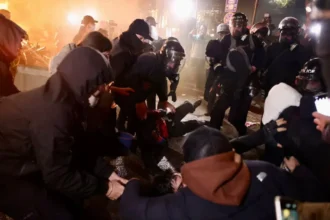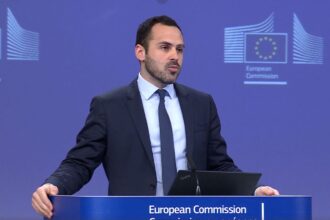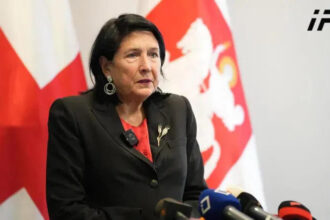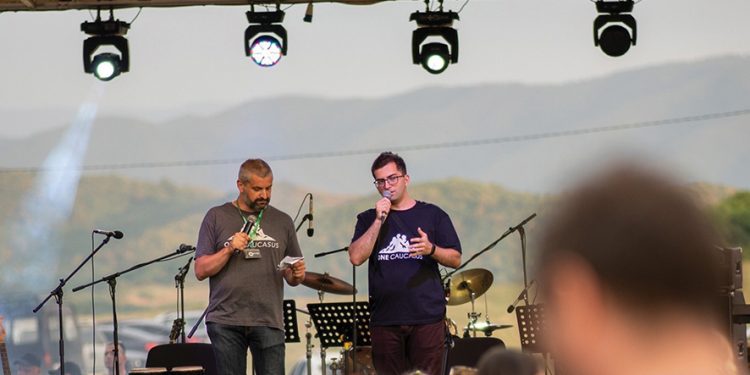The One Caucasus Festival brings together Armenians and Azerbaijanis through volunteer programs, workshops, music and more to make progress within the region.
One Caucasus, a four-day event and non-governmental organization (NGO) in Georgia, was founded in 2014 and is celebrating its 10th anniversary. This event is held in Tserakvi Village in the Kvemo Kartli region in late August every year. It brings together musicians, artists, educators and others from all over the world.
Witek Hebanowski is the Program Director and Initiator for One Caucasus. He started a festival called ‘Transcaucasia’ in Poland about 20 years ago. He describes it as a contemporary ‘Woodstock,’ and tells GEORGIA NOW that his Caucasian friend who attended this event began to wonder why there wasn’t something similar in their area to bring people together. After the issue was raised, a group of people from seven different countries brainstormed the audience for the One Caucasus Festival.
Hebanowski said that it was decided to target the youth in the region and then determine what type they wanted to display.
“[We asked] Do we want to present Caucasus right now?” Hebanowski notes that “Or maybe create some sort of vision of the Caucasus, and how it will function?” “The first person to react was an Armenian curator who said, “You got it. For me, this was the greenlight, because I would not dare start such a program if it did not come from Azerbaijani curators, Armenian curators, and Georgian curatorial staff.”
This year’s festival took place from August 24 to 27, 2009. There were 48 musicians in attendance, including 21 who were Georgian, 11 Armenian/Azerbaijani, and 16 international bands. The festival also included art galleries and other projects that allowed people to learn more about Caucasus.
Hebanowski said that since the festival is free, they make a big call every year for volunteers, including artists, educators, filmmakers and others, to help create and put together content for the festival. Hebanowski said that volunteers are divided into groups of people from different nationalities, and they are sent to remote villages in the Caucasus, to teach skills to children. He said that these skills could include editing movies or taking photographs.
Hebanowski told me that once the volunteer groups arrive in the villages, they give the kids a map of the village. They can learn more about their village, including the history of its streets, the people who live there, monuments and more. During the time spent with the volunteers, each village creates something that will be displayed at the One Caucasus Festival.
Hebanowski says that one of the products this year was a trailer from an Azerbaijani town for a Harry Potter and superhero movie. The children voiced the animation, which was a collection of parodies. The video was shown at the festival after the One Caucasus team completed the post-production.
This year’s festival featured a space called the Gallery of Modern Art (GoMA), which was filled with tablets. Each tablet displayed a different project, curated by each village, so that people could see what was being produced around the Caucasus and learn about these areas. The festival also included a collaborative aspect that involved mixing different musicians.
Hebanowski said that there were at least ten collaborations between musicians of different countries. Hebanowski found it most amazing that the audience did not notice that there were different bands on a track, but rather thought it was a single group.
Hebanowski told GEORGIA NOW that he was glad that the team consisted of Caucasians, but noted that things had gotten harder over the past few years.
“We are glad to have a team and especially work with Armenians, Azerbaijanis. One Caucasus offers many training sessions about the power of negotiation and mediation to solve the Karabakh issue. In One Caucasus, there is also the practice of working together,” Hebanowski explains.
“We now had Armenian bands that wanted to go onstage and perform with Azerbaijani groups, but the problem was because the border with Azerbaijan was closed, we lost the largest metropolitan audience.”
In 2019, more people attended the festival in Baku than in Tbilisi. However, the main audience is local Armenians, Azerbaijanis, and Georgians. The One Caucasus team wanted a location that was easily accessible and near all three Caucasian border. Hebanowski said that they were surprised when they found Marneuli just north of Tserakvi because it was “a complete kaleidoscope” of the Caucasus, with Azerbaijanis and Sunni-Shia, Armenians and Georgians.
Irakli Mikiani, founder of One Caucasus NGO. He said this year’s festival is the biggest they’ve ever had, but it wasn’t without caveats. He said that it took a long time to get the festival confirmed, and that One Caucasus always has a lot of topics and issues people deal with every day. Mikiani said that even though they have often encountered these roadblocks the team has learned how to make light of it and push forward because the festival “must happen.”
The festival and NGO work all year round. Each year, a program is run to promote architecture in three different locations. Volunteer groups go to places where the government is willing and work with locals to develop architectural concepts that the community would like to implement.
Hebanowski says that every year, a volunteer construction crew builds platforms for the festival, including a cinema and furniture, signs, GoMA and more. Other teams are sent into villages in the Caucasus, where they build small houses devoted to integrating games and inspiring the youth.
The team is focusing on the next two-years and reaching out to major artists so that people from around the world can support One Caucasus and make Tserakvi a place of meeting.
“We see this need after war. Hebanowski says it is important for us to use One Caucasus to bring Armenians and Azerbaijanis together as human beings. “We see that young people have this need.”
According to the team everyone has a One Caucasus Story. They are more interested in taking small steps to make a difference than taking on something bigger.
By Shelbi R. Ankiewicz
Read More @ georgiatoday.ge













